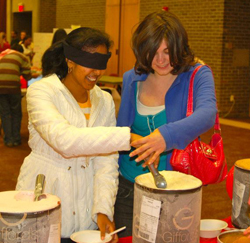Mital Gajjar wasn’t lazy or developmentally challenged. No, the Edison resident was grappling with measurable hearing loss – a loss serious enough that the day’s lessons were flying past her, unheard and unlearned.
More than a dozen years later, the experience continues to have a ripple effect. Now a senior exercise science major in Rutgers’ School of Arts and Sciences, Gajjar went on to found Rutgers Empowering Disabilities, a campus group combining advocacy, education, and social justice programming for and by all students, not just those with disabilities.
“I lost a significant development period in my life, and that created a barrier with other people,” says Gajjar, who will walk with the Class of 2012 this month but who will actually receive her Bachelor of Science degree in October. “I sometimes feel very conscious of my disability. A lot of stereotyping goes on, and that was part of my motivation in starting the group.”
Outfitted with two hearing aids and the ability to read lips, Gajjar says she wanted to provide a space where students with disabilities feel an immediate sense of identification and belonging.
Gajjar’s organization serves the entire university, but concentrates on the New Brunswick campuses. Now in its second year, it meets at the Rutgers Student Center, attracting students who use wheelchairs as well as those living with such conditions as muscular dystrophy and balance impairments, some 20 to 30 members in all.
Participants visit local group homes, engaging with clients through crafts and games. On campus they present programs designed to end some of the stigma disabled people frequently say they encounter.Last November, the group hosted Rutgers alumna Santina Muha, 2009 Miss Wheelchair New Jersey, at a screening of “Defining Beauty.” The documentary follows Muha and three other paraplegic contestants, one of whom goes skydiving despite what many would consider insurmountable barriers.
The organization’s signature event is an annual wheelchair relay, which allows participants to experience the realities of life in a wheelchair in a fun-filled setting.
On top of her hearing loss, Gajjar grapples with a visual impairment. She is extremely nearsighted in one eye and at risk for retinal detachment and eventual blindness if she doesn’t take the proper precautions. She has already undergone multiple operations for the condition.
“It’s like I have one and a half disabilities,” she says wryly.
With it all, Gajjar managed to be elected to the National Honor Society as a senior at Edison High School. She attributes her accomplishments to studying longer and harder than her classmates. It’s not unusual for her to review the same passage in a textbook over and over, at times consulting with a professor for clarification.
Because her compromised hearing often kept her from interacting with her peers when her language patterns were still forming, Gajjar has had to pay special attention to grammar and writing skills. Crowds also present a particular challenge: “Because I’m reading lips, it’s hard to focus on more than one person at a time,” she says.
Her efforts have not slacked off at Rutgers, where in addition to her major in exercise science Gajjar is pursuing double minors in biological sciences and South Asian studies -- all while organizing and running Rutgers Empowering Disabilities and working two evenings a week as a supervisor in the Livingston Learning Center.
The center offers enrichment programs aimed at helping students develop effective learning strategies.
Gajjar says she’s found a welcoming climate at Rutgers, where the university’s Office of Disabilities Services helps with paperwork and accommodations, and faculty members have been eager to see her succeed.
She also is grateful that she received the Rutgers Class of 1945 J.L. Dempsey Memorial Fund scholarship, which supported her financially during her first semester.
After she receives her undergraduate degree, the American-born daughter of Indian immigrants plans to take a year off before starting graduate school to become an occupational therapist. No surprise -- her choice of career is based largely on her own experiences.
“I want to get into a field of health care where I interact with patients, not just with their diagnosis,” she says. “I also would like to be able to teach patients to adapt healthier lifestyles, which is so important toward prevention of many diseases and illnesses.”
Recently, Gajjar was delighted to learn that her organization has won a ROSCAR award -- Rutgers Outstanding Students Celebration and Recognition -- naming its "Candyland Ice Cream Obstacle Course" best innovative program.
Rutgers Student Life-Student Involvement hosts the awards. Organizers of the obstacle course randomly assigned participants a disability and had them create sundaes of different flavors and toppings while working in pairs.
Before launching Rutgers Empowers Disabilities, Gajjar paid a return visit to Edison High School, where she had been invited to speak to a group of students with various disabilities. She came bearing a message for these young college hopefuls, many of whom expressed concern that their physical challenges would bar them from feeling comfortable on a large campus like Rutgers.
“I told them it’s a big university and it has a lot to offer, even if you have a disability,” she recalls. “And I told them they should focus on their ability, rather than on their disability.”




